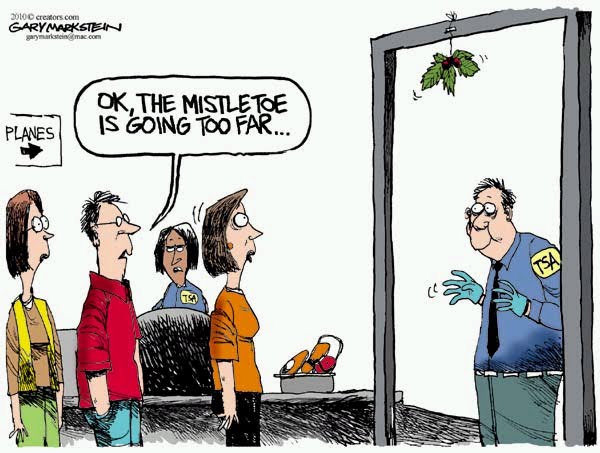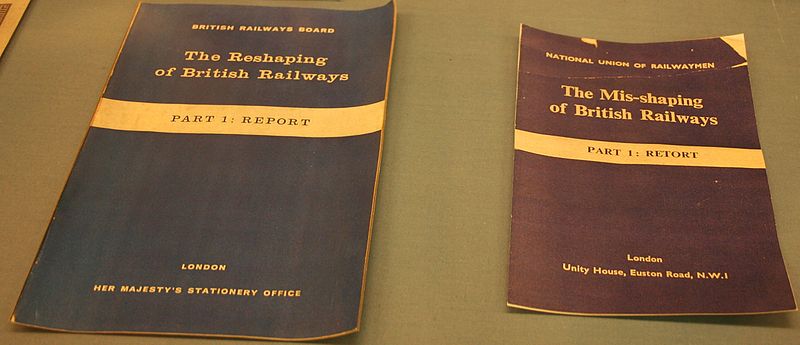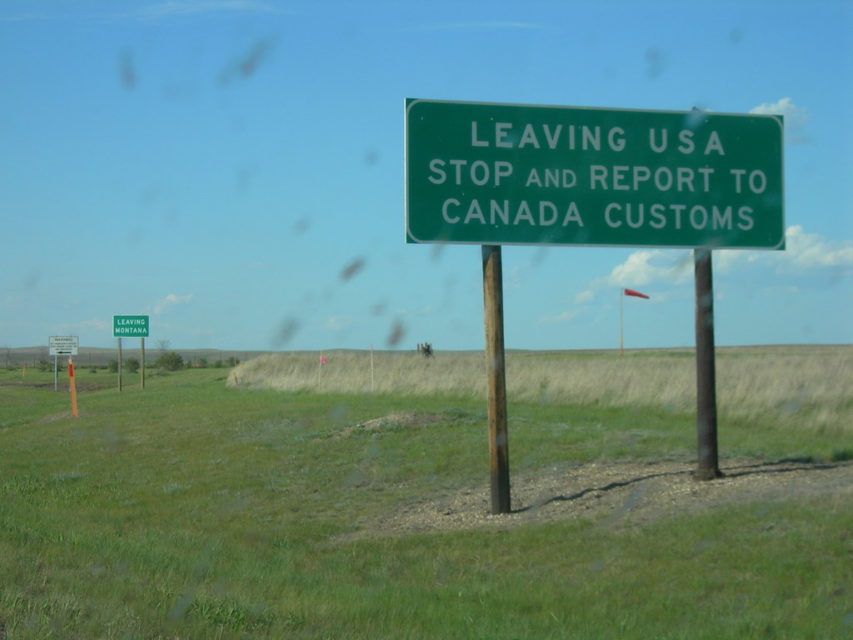
H/T to Economicrot. Many many more at the link.


H/T to Economicrot. Many many more at the link.
With apologies to Margaret Atwood and a thousand other dystopian novelists, we do not have to theorize about what an American police state would look like, because we know what it looks like: the airport, that familiar totalitarian environment where Americans are disarmed, stripped of their privacy, divested of their freedom of speech, herded around like livestock, and bullied by bovine agents of “security” in a theatrical process that has an 85 percent failure rate because it isn’t designed as a security-screening protocol at all but as a jobs program for otherwise unemployable morons.
Kevin D. Williamson, “O’Rourke’s America”, National Review, 2019-10-16.
Ever the contrarian, Tim Worstall responds to an article calling for the “Beeching Axe” cuts to the British passenger railway network in the 1960s to be reversed:

The British Railways Board’s publication The Reshaping of British Railways, Part 1: Report, Beeching’s first report, which famously recommended the closure of many uneconomic British railway lines. Many of the closures were implemented. This copy is displayed at the National Railway Museum in York beside a copy of the National Union of Railwaymen’s published response, The Mis-shaping of British Railways, Part 1: Retort.
Photo by RobertG via Wikimedia Commons.
For background, as the “Beeching Axe” is far less well-known today than it used to be, here’s Wikipedia’s introduction:
The Beeching cuts (also Beeching Axe) were a reduction of route network and restructuring of the railways in Great Britain, according to a plan outlined in two reports, The Reshaping of British Railways (1963) and The Development of the Major Railway Trunk Routes (1965), written by Dr Richard Beeching and published by the British Railways Board.
The first report identified 2,363 stations and 5,000 miles (8,000 km) of railway line for closure, 55% of stations and 30% of route miles, with an objective of stemming the large losses being incurred during a period of increasing competition from road transport and reducing the rail subsidies necessary to keep the network running; the second identified a small number of major routes for significant investment. The 1963 report also recommended some less well-publicised changes, including a switch to containerisation for rail freight.
Protests resulted in the saving of some stations and lines, but the majority were closed as planned, and Beeching’s name remains associated with the mass closure of railways and the loss of many local services in the period that followed. A few of these routes have since reopened; some short sections have been preserved as heritage railways, while others have been incorporated into the National Cycle Network or used for road schemes; others now are lost to construction, have reverted to farmland, or remain derelict.
Worstall says:
[Dr. Richard] Beeching is one of the most universally hated figures in British politics, yet I have no doubt that he was that rare creature, someone working for the state who actually got things about right.
What Dr Richard Beeching mostly did was a cold, analytical report into the railways and recommended cutting large chunks of it that no-one was using. This was done because the railways were losing a fortune every year. And he mostly got it right. He assumed that we would replace trains with buses, which isn’t a bad idea at all. […]
One of the reasons I think Beeching ended up more right than he thought was the arrival of the car. Yes, cars can be environmentally damaging, cause deaths and so forth. Personally, I lean towards the bus or train as a preference. But you can’t ignore the upsides of cars.
The biggest problems with trains are connection time, flexibility and that there’s no market in there. Rail is quite poor at doing their one job: getting a train from A to B. You’d think after 150 years, they’d have it going pretty good, but crew not turning up, signal failures, electrical failures, doors not closing properly. industrial action are not that rare. The problems are certainly more common than if you drive a Toyota Corolla on the motorway to work. Your driver will turn up (because it’s you), the doors will close, the car will run pretty much perfectly. You also have no connection time in that Corolla. You turn off one road straight onto another. You can also go when you please. Middle of the night, middle of the day.
Arthur Chrenkoff outlines the self-imposed hardship of a new Swedish MEP as he struggles to make his 24-hour weekly commute between Stockholm and Strasbourg (because he’s pretending that there are no flights between those two locations) and explains that it’s emblematic of the kind of future “our” leaders want all of us peasants to be living in the future:

Greta Thunberg at the EU Parliament, 16 April, 2019.
European Parliament photo via Wikimedia Commons.
Listen, I’m all for it; if people want to go back in time as a result of their own free choice that’s wonderful. At least these martyrs for Gaia are putting their money where their mouth is – on train as opposed to plane tickets. They are not being hypocrites, unlike the two hundred celebrities who came on 114 private jets and numerous superyachts to Google’s climate change summit in Sicily the other week. Even St Greta herself, the teenage idiot savant of the green movement, will be eschewing plane travel and going to the UN Climate Action Summit in New York in September on a zero-emission yacht. Want to suffer 24-hour Strasbourg-Stockholm regular commutes or a few weeks at sea between Europe and America so as not to sin again the planet, knock yourself out. My problem starts as soon as the environmental flagellanti decide it’s not enough that simply they care and want to start imposing their totalitarian solutions on everyone else.
[…]
This indeed seems to be the vision of an ecommunist utopia now increasingly on offer from its vocal and influential supporters:
- As Thunberg herself declares in her musical collaboration with the Brit pop band The 1975 released last month (all proceeds to the pests of Extinction Rebellion who have a tendency to glue themselves to busy intersections): it’s “time to rebel” and for “civil disobedience” … “We have to acknowledge that the older generations have failed, all political movements in their current form have failed, but Homo sapiens have not yet failed … Now is not the time for speaking politely. Now is the time to speak clearly.”
- David Runciman, politics professor at Cambridge University: “If electoral democracy is inadequate to the task of addressing climate change, and the task is the most urgent one humanity faces, then other kinds of politics are urgently needed … Channeling more energy into these other forms of democracy — into citizens’ assemblies and civil disobedience, rather than elections and party-building — will change our politics drastically. But it may be the only way to ensure our planet does not change beyond recognition.”
- Greenpeace: “We’re not advocating that everyone adopt a ‘meatless’ diet tomorrow. But we all must develop “meat consciousness” and reduce the level of meat in our diets. Shifting to more plant-based foods is essential to combatting climate change, soil, air and water pollution, ocean dead zones, and myriad other problems caused by industrial livestock production.” Sentiments echoed this week by UN’s Intergovernmental Panel on Climate Change.
- And don’t even mention Alexandria Ocasio-Cortez’s Green New Deal.
This is the future according to eco-warriors: anti-democratic, anti-growth and prosperity, with your options on everything from how (and if) you travel to what you eat restricted by your moral betters.
As my more favourite Scandinavian, Bjorn Lomborg, wrote recently:
This year, the world will spend $US162 billion ($230bn) subsidising renewable energy, propping up inefficient industries and supporting middle-class homeowners to erect solar panels, according to the International Energy Agency. In addition, the Paris Agreement on climate change will cost the world from $US1 trillion to $US2 trillion a year by 2030. Astonishingly, neither of these hugely expensive policies will have any measurable impact on temperatures by the end of the century …
Global warming is a real, man-made problem — but it is just one of many challenges facing humanity. We shouldn’t base our policy decisions on Hollywood movies or on scare scenarios but on the facts. According to the UN Intergovernmental Panel on Climate Change, even if we did absolutely nothing to respond to global warming, the total impact by the 2070s will be the equivalent to a 0.2 per cent to 2 per cent loss in average income. That’s a challenge that requires our attention — but it’s far from the end of the world …
Despite costing a fortune, the Paris Agreement will have virtually no impact on global temperatures. The UN Framework Convention on Climate Change has estimated that even if every country makes every single carbon cut suggested in the Paris treaty to the fullest extent, CO2 emissions would be cut by only 1 per cent of what would be needed to keep temperature rises under 2C. Incurring an annual $US1 trillion cost while failing to rein in temperature rises is a very poor idea.
Overly Sarcastic Productions
Published on 23 Jul 2019It’s Copenhagen time! Hop on your bike and ride around one of Europe’s fanciest cities.
PATREON: https://www.Patreon.com/OSP
MERCH LINKS: https://www.redbubble.com/people/OSPY…
OUR WEBSITE: https://www.OverlySarcasticProductions.com
Find us on Twitter https://www.Twitter.com/OSPYouTube
Find us on Reddit https://www.Reddit.com/r/OSP/
Overly Sarcastic Productions
Published on 19 Jul 2019Go to https://NordVPN.com/overlysarcastic and and use code
OVERLYSARCASTICto get 75% off a 3 year plan and an extra month for free. Protect yourself online today!On this episode of History-Makers, Blue takes a trip alongside the legendary explorer Marco Polo to figure out how the intrepid Venetian merchant made his way to the Mongol Empire and back, and what that means for his written account of those Travels.
What History-Maker do you want to see next? Leave a comment!
NEW MERCH: “Let’s Do Some History” — https://www.redbubble.com/people/ospy…
NEW STORE: https://www.redbubble.com/people/OSPY…PATREON: https://www.Patreon.com/OSP
OUR WEBSITE: https://www.OverlySarcasticProductions.com
Find us on Twitter https://www.Twitter.com/OSPYouTube
Find us on Reddit https://www.Reddit.com/r/OSP/
TimeGhost History
Published on 10 Jul 2019With thousands of planes left over from World War One, hobby pilots and entrepreneurs set out to create the modern airline industry. Charles Lindbergh, Amelia Earhart, and many more set record after record, while airplane manufacturers start the creation of passenger, freight planes, and a new generation of aerial weapons.
Join us on Patreon: https://www.patreon.com/TimeGhostHistory
Hosted by: Indy Neidell
Written by: Joram Appel and Spartacus Olsson
Directed and Produced by: Astrid Deinhard and Spartacus Olsson
Executive Producers: Bodo Rittenauer, Astrid Deinhard, Indy Neidell, Spartacus Olsson
Creative Producer : Joram Appel
Post Production Director: Wieke Kapteijns
Research by: Joram Appel
Edited by: Daniel WeissArchive by Reuters/Screenocean https://www.screenocean.com
A TimeGhost chronological documentary produced by OnLion Entertainment GmbH
Overly Sarcastic Productions
Published on 9 Jul 2019O Chicago, a city near and dear to my heart. And not just because I have a healthy respect for pizza that’s functionally pie.
PATREON: https://www.Patreon.com/OSP
OUR WEBSITE: https://www.overlysarcasticproductions.com/
Find us on Twitter https://www.Twitter.com/OSPYouTube
Find us on Reddit https://www.Reddit.com/r/OSP/
At the very end of his recent book Romance of the Rails, Randal O’Toole regretfully (he really, genuinely is a train fan) answers the question three ways … none of which bolster the hopes that the United States will go back to great passenger railway service:
First, when we had great trains, they were used mainly by the elite, and that remains true of great trains in other countries today. Before 1910, it is likely that a majority of Americans had never traveled more than 50 miles from home, and most had never been on a train, while many others had taken only one or two train trips in their life. As James Hill observed, “the so-called ‘travelling public’ forms in reality but a small, and the more fortunate class of the community.” If he was prejudiced against passenger trains, as some claim, it may have been for altruistic reasons, as the people who relied on freight trains “direct and indirect, include all. Hence justice requires that railway systems … should be cautious not to favor passenger traffic at the necessary expense of freight payers.” It is neither sensible nor fair fo the government to subsidize transportation catering mainly to the wealthy.
Second, new transportation technologies have replaced trains and streetcars. Planes are faster and less expensive for long distances; cars and buses are more convenient and less expensive for short distances; and there is no midrange distance at which passenger rail has an advantage over both cars and planes.
Third, and just as important, other new technologies, including the moving assembly line, telecommunications and the electrical grid, have reshaped our cities so the urban patterns that once made rail convenient to large numbers (though never a majority) of people have been replaced by patterns in which rail makes no sense for passenger travel.
Although we might want great trains in our fantasy of what the world should be like, the reality is we don’t need trains. Most Americans don’t ride the trains we have, nor would they ride them even if they met some arbitrary devinition of “great.” We love passenger trains, and we will remember them in museums and tourist lines. But if the government stays involved in transportation at all, it should be to prepare for the next revolution in transportation, not to try to reverse the previous one.
Overly Sarcastic Productions
Published on 2 Jul 2019The summer stupidity continues with another city review! I hope you like seafood, tea shops, woodlands, college and twisty streets because boston has all this and… not much else!
PATREON: https://www.Patreon.com/OSP
Overly Sarcastic Productions
Published on 25 Jun 2019For more summer fun, we’re heading to London! Let us know what other fun side-content you’d like to see. We’ll see you with more long-form content on Friday!
PATREON: https://www.Patreon.com/OSP
OUR WEBSITE: https://www.OverlySarcasticProduction…
Find us on Twitter https://www.Twitter.com/OSPYouTube
Find us on Reddit https://www.Reddit.com/r/OSP/
Overly Sarcastic Productions
Published on 18 Jun 2019Welcome to summer break! We’re beta-testing a new kind of video to punctuate our REAL weekly Friday content on lazy summer Tuesdays. Let us know if this brand of fast-talking stupidity is something you’d potentially like to see more of! As always, regular content returns Friday.
PATREON: http://www.Patreon.com/OSP

A few years ago, many civil libertarians were upset that the US government allowed warrantless searches of electronic devices at the border, but it was less well known that the Canadian Border Services Agency does the same at the Canadian border:

“Canadian Border Sign” by jimmywayne is licensed under CC BY-NC-ND 2.0
According to the CBSA, it has the right to search electronic devices at the border for evidence of customs-related offences — without a warrant — just as it does with luggage.
If travellers refuse to provide their passwords, officers can seize their devices.
The CBSA said that between November 2017 and March 2019, 19,515 travellers had their digital devices examined, which represents 0.015 per cent of all cross-border travellers during that period.
During 38 per cent of those searches, officers uncovered evidence of a customs-related offence — which can include possessing prohibited material or undeclared goods, and money laundering, said the agency.
While the laws governing CBSA searches have existed for decades, applying them to digital devices has sparked concern in an era where many travellers carry smartphones full of personal and sometimes very sensitive data.
A growing number of lawyers across Canada argue that warrantless digital device searches at the border are unconstitutional, and the practice should be stopped or at least limited.
“The policy of the CBSA of searching devices isn’t something that is justifiable in a free and democratic society,” said Wright who ran as a Green Party candidate in the 2015 federal election.
“It’s appalling, it’s shocking, and I hope that government, government agencies and the courts, and individual citizens will inform themselves and take action.”
Although the blog post is nearly a month old, I completely missed it when it was first posted. It’s called “How to travel to India”, but it’s really more about how to get the best of your visit while you’re there. I’ve never been to India (and it seems unlikely I’ll ever get to visit), but from reading the accounts of other visitors, Tyler has some excellent advice here:
4. Every single part of India is interesting and worth visiting, as far as I can tell after five trips. That said, I find Bangalore quite over-visited relative to its level of interest.
5. My favorite places in India are Mumbai, Chennai, Rajasthan, and Kolkaata. Still, I could imagine a rational person with interests broadly similar to my own having a quite different list.
6. India has the best food in the world. It is not only permissible but indeed recommended to take all of your meals in fancy hotel restaurants. Do not eat the street food in India (and I eat it virtually everywhere else). It is also permissible to find two or three very good hotel restaurants — or even one — and simply run through their menus. You won’t be disappointed.
7. Invest in a very, very good hotel. It is affordable, and you will need it, and it will be a special memory all its own.
8. Being driven around in the Indian countryside is terrifying (and I have low standards here, I do this all the time in other non-rich countries). If it were safer, I would see many more parts of India. But it isn’t. So I don’t.
I’ve posted this before, and it doesn’t really relate to Tyler’s travel tips, but I still find it amusing:
At PJ Media, Charlie Martin does a good job of showing why the fast, efficient passenger railways of Europe are not replicated in the US and Canada:
… the usual story is something like “the United States should have a world-class passenger train system, with high-speed rail like the French and Japanese have.” @AOC’s official-no-fake-no-just-a-draft-Republican-conspiracy-theory-why-are-you-all-being-mean? Green New Deal FAQ wanted one so good that air travel would become “unnecessary.”
Sounds great, and I love the covert “MAGA” aspect of the pitch, but it has one great big, pretty much insurmountable problem: America.
Not the country, the geography. People living on the coasts just don’t realize how big this country is. I was discussing it on Twitter with a Swiss who lives in Zürich who was telling me how great the Europeans trains are — and they really are comfortable, pretty fast, have great scenery to look at — but, well, let’s compare Colorado and Switzerland. Similar climate, mountains, pretty scenery, cranky natives who are suspicious of newcomers. But let’s go to the maps:
Colorado is 6.5 times as big, has 60 percent of the population — and, it happens, about two-thirds of the gross “national” product per capita.
Compare the lower 48 states with all of Western Europe:
The truth is, we’re in flyover country out here. The coastal clerisy don’t realize that on their five-hour flight from LAX to LGA they’re traveling 2,500 miles. Now, back in the days of the Super Chief and the 20th Century Limited, you could make that trip by train in only 76 hours, not counting changing trains in Chicago. (It takes longer on Amtrak.)
So, let’s say we could get high-speed trains for the whole trip that averaged 200 miles per hour, and could travel as the crow flies: that’s 12.5 hours.
Except of course you couldn’t because the crow is flying over some of the highest mountains in the country. You’re going to need rights of way, and you can’t use the rights of way that exist because they’re not suited for that kind of speed and they’re pretty full anyway. Also, it wouldn’t do to interrupt the existing freight lines, which actually are about as good as anywhere in the world.
Powered by WordPress